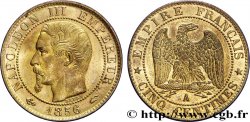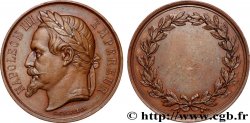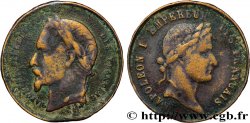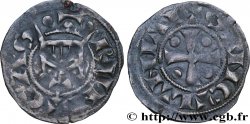E-auction 626-618387 - fme_999847 - SECOND EMPIRE Médaille, Place du Roi de Rome / Trocadéro
Чтобы принять участие в торгах, вы должны войти в систему и стать подтвержденным участником аукциона. Войдите, чтобы сделать ставку. Ваш аккаунт будет подтвержден в течение 48 часов. Не ждите до закрытия торгов, чтобы зарегистрироваться.Сделав ставку на данный товар, вы вступаете в юридическое соглашение на покупку выбранного товара и нажатием кнопки «Сделать ставку» подтверждаете принятие вами условий интернет-аукционов cgb.fr.
Ставка может бить сделана только в полном эквиваленте евро. Торги закроются согласно времени, указанному в описании товара, все ставки, сделанные после закрытия торгов, учитываться не будут. Не следует откладывать предложение вашей ставки до последнего момента, так как система может не успеть обработать вашу заявку, и ваша ставка не будет принята. Более детальную информацию вы найдёте здесь: FAQ по интернет-аукционам.
БЕСПЛАТНО.
БЕСПЛАТНО.
| Оценить : | 20 € |
| Цена : | 3 € |
| Максимальная предлагаемая цена : | 3 € |
| Конец торгов : | 14 April 2025 20:52:40 |
| Участников : | 2 Участников |
Тип Médaille, Place du Roi de Rome / Trocadéro
Дата: 1867
Монетный двор / Город: 75 - Paris
Металл: brass
Диаметр: 17,50 mm
Ориентация осей монеты: 12 h.
Вес: 1,23 g.
Век: lisse
Пуансон: sans poinçon
Комментарии о состоянии
Patine hétérogène avec des traces d’usure, quelques coups et rayures. Présence de tâches d’oxydation
Лицевая сторона
Аверс: легенда: J. C. F. NAPOLÉON - ROI DE ROME.
Аверс: описание: Tête à gauche du Roi de Rome, les cheveux mi longs.
Обратная сторона
Реверс: легенда: INAUGURATION / DE LA PLACE / DU / ROI DE ROME / 1867.
Реверс: Описание: Légende en 5 lignes dans une couronne de lauriers.
Комментарий
Médaille avec un diamètre sans bélière de : 14 mm
Napoléon donna à son fils le titre de roi de Rome. Le sénatus-consulte organique du 17 février 1810 prévoyait en son article 7 : « Le prince impérial [c'est-à-dire le prince héritier] porte le titre et reçoit les honneurs de roi de Rome ». Ce titre n'avait pas été prévu par la constitution de l'an XII.
Deux voies aménagées sous le Second Empire à Paris furent dédiées au roi de Rome :
- Le boulevard de Passy devint l'avenue du Roi-de-Rome en 1864. Cette avenue devint l'avenue Kléber par arrêté du 16 août 1879.
- La place du Roi-de-Rome. Cette place devint la place du Trocadéro par arrêté du 1er février 1877 puis la place du Trocadéro-et-du-11-Novembre (sic) par arrêté municipal du 18 octobre 1978.
L’avenue menait à une place proche de l’emplacement où aurait dû s’élever le palais du Roi de Rome..
Medal with a diameter without bail of: 14 mm Napoleon gave his son the title of King of Rome. The organic senatus-consultum of February 17, 1810 provided in its article 7: \\\"The imperial prince [that is to say the crown prince] bears the title and receives the honors of King of Rome.\\\" This title had not been provided for in the constitution of the year XII. Two roads built under the Second Empire in Paris were dedicated to the King of Rome: - The boulevard de Passy became the avenue du Roi-de-Rome in 1864. This avenue became the avenue Kléber by decree of August 16, 1879. - The place du Roi-de-Rome. This square became the Place du Trocadéro by decree of February 1, 1877, then the Place du Trocadéro-et-du-11-Novembre (sic) by municipal decree of October 18, 1978. The avenue led to a square close to the site where the palace of the King of Rome should have been built.
Napoléon donna à son fils le titre de roi de Rome. Le sénatus-consulte organique du 17 février 1810 prévoyait en son article 7 : « Le prince impérial [c'est-à-dire le prince héritier] porte le titre et reçoit les honneurs de roi de Rome ». Ce titre n'avait pas été prévu par la constitution de l'an XII.
Deux voies aménagées sous le Second Empire à Paris furent dédiées au roi de Rome :
- Le boulevard de Passy devint l'avenue du Roi-de-Rome en 1864. Cette avenue devint l'avenue Kléber par arrêté du 16 août 1879.
- La place du Roi-de-Rome. Cette place devint la place du Trocadéro par arrêté du 1er février 1877 puis la place du Trocadéro-et-du-11-Novembre (sic) par arrêté municipal du 18 octobre 1978.
L’avenue menait à une place proche de l’emplacement où aurait dû s’élever le palais du Roi de Rome..
Medal with a diameter without bail of: 14 mm Napoleon gave his son the title of King of Rome. The organic senatus-consultum of February 17, 1810 provided in its article 7: \\\"The imperial prince [that is to say the crown prince] bears the title and receives the honors of King of Rome.\\\" This title had not been provided for in the constitution of the year XII. Two roads built under the Second Empire in Paris were dedicated to the King of Rome: - The boulevard de Passy became the avenue du Roi-de-Rome in 1864. This avenue became the avenue Kléber by decree of August 16, 1879. - The place du Roi-de-Rome. This square became the Place du Trocadéro by decree of February 1, 1877, then the Place du Trocadéro-et-du-11-Novembre (sic) by municipal decree of October 18, 1978. The avenue led to a square close to the site where the palace of the King of Rome should have been built.








 Cообщить об ошибке
Cообщить об ошибке Распечатать страницу
Распечатать страницу Отправить мой выбор
Отправить мой выбор Задать вопрос
Задать вопрос Consign / sell
Consign / sell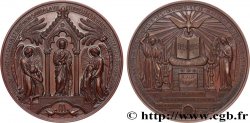
 Информация
Информация

